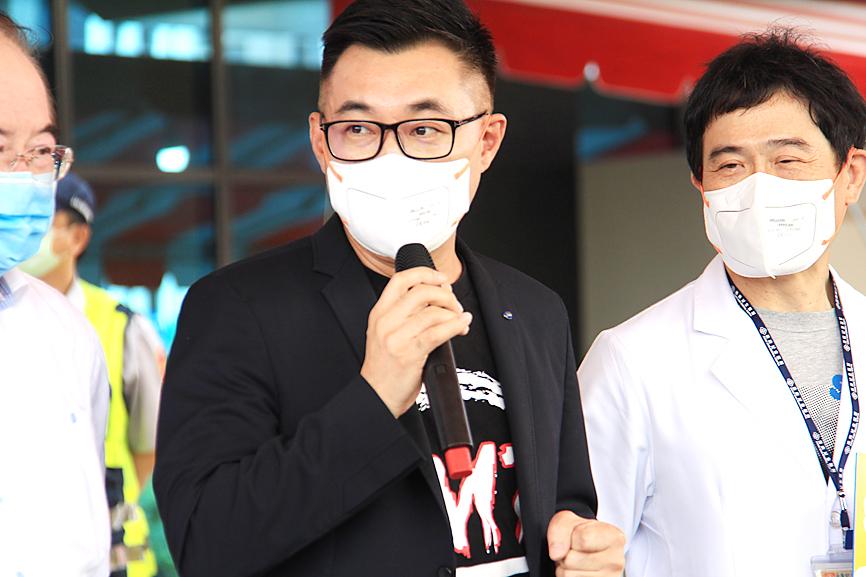The Chinese Nationalist Party (KMT) has not abandoned the idea of peace across the Taiwan Strait, KMT Chairman Johnny Chiang (江啟臣) said yesterday, after former Changhua County commissioner Cho Po-yuan (卓伯源) said that the party’s leadership had discarded the “foundation for cross-strait peace.”
The KMT’s leadership “threw away the foundation for cross-strait peace, the 1992 consensus,” Cho said in a five-minute video posted online on Sunday, in which he announced his intent to run for party chairperson in the upcoming election.
The so-called “1992 consensus,” a term former Mainland Affairs Council chairman Su Chi (蘇起) in 2006 admitted making up in 2000, refers to a tacit understanding between the KMT and the Chinese government that both sides of the Strait acknowledge there is “one China,” with each side having its own interpretation of what “China” means.

Photo: Chiu Shu-yu, Taipei Times
Asked yesterday for comment on the sidelines of donating medical supplies to Tucheng Hospital in New Taipei City, Chiang said that some of what Cho expressed on Sunday coincided with what he had presented at the KMT National Congress in September last year.
Chiang said that he made the KMT’s discourse on cross-strait relations “very clear” at the congress.
The party advocates “a 1992 consensus based on the Constitution of the Republic of China,” Chiang added.
“On the one hand, we emphasize the subjectivity of the Republic of China,” he said. “On the other, we emphasize the importance of the 1992 consensus, of having one China with different interpretations (一中各表) and of seeking common ground while reserving differences (求同存異).”
“There is no such thing as the party abandoning the idea of cross-strait peace,” Chiang said.
Regarding plans for this year’s KMT chairperson election, Chiang said the party’s Central Standing Committee decided to discuss a timeline for the election once the Central Epidemic Command Center lowered the nationwide COVID-19 alert from level 3 to level 2.
A nationwide level 3 pandemic alert issued on May 19 is scheduled to continue through July 26.
Elections for the KMT chairperson and delegates to the party’s 21st national congress had been scheduled to take place on Saturday next week.
At a May 26 meeting, the KMT Central Standing Committee postponed the elections given the COVID-19 situation.
Cho’s announcement made him the fourth candidate to run for KMT chairperson.
On Feb. 20, Chiang announced that he would seek to be re-elected. He won the KMT’s chairperson by-election on March 7 last year and was sworn in two days later.
Additional reporting by CNA

INFRASTRUCTURE: Work on the second segment, from Kaohsiung to Pingtung, is expected to begin in 2028 and be completed by 2039, the railway bureau said Planned high-speed rail (HSR) extensions would blanket Taiwan proper in four 90-minute commute blocs to facilitate regional economic and livelihood integration, Railway Bureau Deputy Director-General Yang Cheng-chun (楊正君) said in an interview published yesterday. A project to extend the high-speed rail from Zuoying Station in Kaohsiung to Pingtung County’s Lioukuaicuo Township (六塊厝) is the first part of the bureau’s greater plan to expand rail coverage, he told the Liberty Times (sister paper of the Taipei Times). The bureau’s long-term plan is to build a loop to circle Taiwan proper that would consist of four sections running from Taipei to Hualien, Hualien to

A relatively large earthquake may strike within the next two weeks, following a magnitude 5.2 temblor that shook Taitung County this morning, the Central Weather Administration (CWA) said. An earthquake struck at 8:18am today 10.2km west of Taitung County Hall in Taitung City at a relatively shallow depth of 6.5km, CWA data showed. The largest intensity of 4 was felt in Taitung and Pingtung counties, which received an alert notice, while areas north of Taichung did not feel any shaking, the CWA said. The earthquake was the result of the collision between the Philippine Plate and the Eurasian Plate, the agency said, adding

Snow fell in the mountainous areas of northern, central and eastern Taiwan in the early hours of yesterday, as cold air currents moved south. In the northern municipality of Taoyuan, snow started falling at about 6am in Fusing District (復興), district head Su Tso-hsi (蘇佐璽) said. By 10am, Lalashan National Forest Recreation Area, as well as Hualing (華陵), Sanguang (三光) and Gaoyi (高義) boroughs had seen snowfall, Su said. In central Taiwan, Shei-Pa National Park in Miaoli County and Hehuanshan National Forest Recreation Area in Nantou County saw snowfall of 5cm and 6cm respectively, by 10am, staff at the parks said. It began snowing

The 2025 Kaohsiung Wonderland–Winter Amusement Park event has teamed up with the Japanese manga series Chiikawa this year for its opening at Love River Bay yesterday, attracting more than 10,000 visitors, the city government said. Following the success of the “2024 Kaohsiung Wonderland” collaboration with a giant inflatable yellow duck installation designed by Dutch artist Florentijn Hofman, this year the Kaohsiung Tourism Bureau collaborated with Chiikawa by Japanese illustrator Nagano to present two giant inflatable characters. Two inflatable floats — the main character, Chiikwa, a white bear-like creature with round ears, and Hachiware, a white cat with a blue-tipped tail